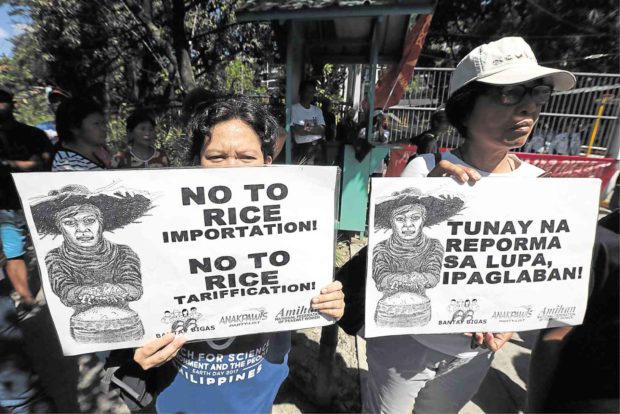
FARM VOICE Peasant groups rally at two departments—agriculture and agrarian reform—in Quezon City to protest rice importation and land conversions. —GRIG C. MONTEGRANDE
The economic research group Ibon Foundation on Tuesday warned that the rice tariffication law would neither improve the productivity of local farmers, lower the price of rice, or ensure a stable rice supply unless the government gave substantial support to agriculture.
The rice tariffication law replaces volume restrictions and allows unlimited rice importation, with a 35-percent tariff on rice imports from members of the Association of Southeast Asian Nations (Asean) and 50 percent from non-Asean countries.
It takes effect on March 5, with up to P11 billion in import duties expected to be collected during its first year of implementation, the Department of Finance (DOF) said on Tuesday.
Under the law, a P10-billion rice competitiveness enhancement fund will be taken from the tariff revenues to support Filipino farmers for six years.
Beyond control
But Ibon said the law could not control the global prices of rice or prevent possible price manipulation by domestic rice traders.
“Global rice prices are volatile and can become very high depending on the production conditions of exporting countries. Rice production [in] Vietnam and Thailand is subsidized and incentivized, making their rice cheap. But they can decide to prioritize local consumption and ban exports, making cheap rice unavailable to Filipino consumers,” Ibon warned.
Danilo Ramos, chair of Kilusang Magbubukid ng Pilipinas (KMP), also expressed concern about the Department of Agrarian Reform’s (DAR) “fast-track land use conversion” that, he said, would endanger the livelihood of those dependent on the country’s P360-billion rice industry.
The P10-billion rice fund would prove futile for farmers “if there are no more rice lands left after the accelerated conversion of agricultural lands proposed by [the] DAR,” Ramos said, adding that “rice farmers demand free land distribution and not land use conversion.”
Palace assurance
But Malacañang has assured farmers that safeguards would be put in place to prevent the misuse of the fund, with the Department of Agriculture (DA) being accountable and responsible for it.
The DA, according to presidential spokesperson Salvador Panelo, would work with farmers cooperatives and groups to validate the list of beneficiaries.
The Congressional Oversight Committee on Agricultural and Fisheries Modernization will also conduct a periodic review of the fund, he added.
At a press briefing in Malacañang, DOF spokesperson Antonio Joselito Lambino II said “the implementing rules and regulations of the new law is being crafted to ensure that [there would be no corruption].”
Lambino said the rice fund would be used to improve existing infrastructure in the rice production sector.
Alternate bill
Both Ibon and KMP are pushing for House Bill No. 8512, or the proposed Rice Industry Development Act, filed by Anakpawis party-list group that is asking for an annual allocation of P61 billion for three years, or a total of P183 billion, for the development of the rice sector.
The bill included subsidies for rice production and socialized credit; irrigation development, repair and rehabilitation of existing irrigation systems; postharvest facilities development; farm inputs; and research and development of sustainable agriculture technologies. —With reports from Christine O. Avendaño, Julie M. Aurelio and Ben O. de Vera